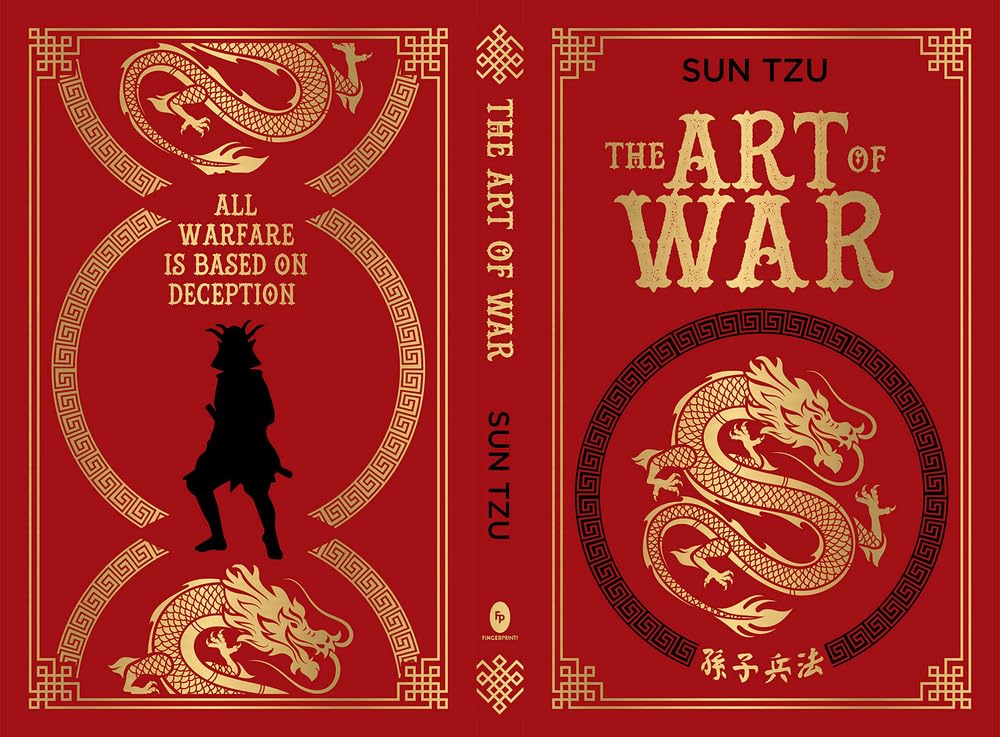The Art of War is a timeless and influential book on military strategy, written by the ancient Chinese military strategist Sun Tzu. It is considered one of the most important and enduring treatises on warfare and has been studied and applied in various fields beyond the military, including business, politics, and sports. The book is composed of 13 chapters, each addressing different aspects of warfare, from planning and tactics to the use of spies and the importance of leadership. The Art of War is not just a manual for winning battles, but a guide to understanding the nature of conflict and how to achieve victory with minimal bloodshed and resources. Sun Tzu’s teachings have stood the test of time and continue to be relevant in today’s world, making it a valuable resource for anyone seeking to understand the principles of strategy and leadership.
The Importance of Strategy in Warfare
Strategy is a crucial element in warfare, as it determines the overall direction and approach to achieving victory. Without a well-thought-out strategy, an army is likely to face unnecessary risks and setbacks on the battlefield. Sun Tzu emphasizes the importance of strategic planning in The Art of War, stating that “the general who wins a battle makes many calculations in his temple before the battle is fought.” This highlights the need for careful consideration and planning before engaging in any conflict. A good strategy takes into account various factors such as the strengths and weaknesses of the enemy, the terrain, weather conditions, and the morale of one’s own troops. It also involves deception, maneuvering, and the use of intelligence to gain an advantage over the opponent. In essence, strategy is about outthinking and outmaneuvering the enemy to achieve victory with the least amount of resistance.
In modern warfare, strategy remains just as important as it was in ancient times. The advancement of technology and changes in tactics may have altered the way wars are fought, but the fundamental principles of strategy still apply. Whether it’s in conventional warfare, guerrilla tactics, or cyber warfare, having a clear and effective strategy is essential for achieving military objectives while minimizing casualties and resources. The lessons from The Art of War continue to be studied and applied by military leaders around the world, demonstrating its enduring relevance in the realm of warfare.
Sun Tzu’s Principles of Strategy
Sun Tzu’s principles of strategy are timeless and have been applied not only in warfare but also in various other fields. One of his key teachings is the importance of knowing oneself and knowing the enemy. Sun Tzu emphasizes the need for self-awareness and understanding one’s own strengths and weaknesses, as well as being able to accurately assess the strengths and weaknesses of the opponent. This knowledge forms the basis for developing a successful strategy that exploits the enemy’s vulnerabilities while leveraging one’s own strengths.
Another important principle from The Art of War is the concept of deception and maneuvering. Sun Tzu advocates for using deception to confuse and mislead the enemy, creating opportunities for surprise attacks and gaining a strategic advantage. He also emphasizes the importance of maneuvering and adapting to changing circumstances on the battlefield, stating that “the clever combatant imposes his will on the enemy, but does not allow the enemy’s will to be imposed on him.” This highlights the need for flexibility and adaptability in strategy, as well as the ability to seize opportunities as they arise.
Sun Tzu’s teachings also stress the importance of understanding the terrain and weather conditions, as well as the use of spies and intelligence gathering. By taking these factors into account, a strategist can make informed decisions that increase the likelihood of success on the battlefield. Overall, Sun Tzu’s principles of strategy provide valuable insights into how to approach conflict with wisdom and foresight, making them applicable not only in warfare but also in other competitive endeavors.
Applying The Art of War to Modern Business
| Key Principles | Application in Business |
|---|---|
| Know Yourself and Your Enemy | Understanding your own strengths and weaknesses as well as those of your competitors |
| Adaptability | Being flexible and able to adjust strategies based on changing market conditions |
| Deception | Using tactics to mislead competitors and gain a strategic advantage |
| Speed and Timing | Acting quickly and seizing opportunities before competitors |
| Leadership and Discipline | Effective leadership and maintaining discipline within the organization |
The principles outlined in The Art of War have been widely applied to modern business practices, as they offer valuable insights into competition, strategy, and leadership. In today’s highly competitive business environment, companies face constant challenges from rivals, changing market conditions, and evolving consumer preferences. Sun Tzu’s teachings provide a framework for understanding how to navigate these challenges and achieve success in business.
One key concept from The Art of War that has been applied to business is the idea of knowing oneself and knowing the competition. Just as in warfare, businesses must have a clear understanding of their own strengths and weaknesses, as well as an accurate assessment of their competitors’ capabilities. This knowledge forms the basis for developing effective business strategies that capitalize on strengths while exploiting weaknesses in the market.
Deception and maneuvering are also relevant concepts from The Art of War that can be applied to business. In a competitive market, businesses often engage in tactics such as pricing strategies, marketing campaigns, and product differentiation to gain an advantage over their rivals. By understanding how to use deception and maneuvering effectively, businesses can outmaneuver competitors and gain market share.
Additionally, Sun Tzu’s emphasis on leadership and decision-making has direct relevance to business management. Effective leadership is crucial for guiding a company through challenges and achieving its objectives. By applying Sun Tzu’s principles of leadership, business leaders can inspire their teams, make informed decisions, and adapt to changing market conditions.
Overall, The Art of War offers valuable lessons for businesses seeking to gain a competitive edge in their industry. By applying Sun Tzu’s principles of strategy, deception, maneuvering, and leadership, companies can navigate challenges more effectively and achieve long-term success.
The Role of Leadership in Strategy
Leadership plays a critical role in shaping strategy and guiding an organization towards its goals. In The Art of War, Sun Tzu emphasizes the importance of strong leadership in achieving victory on the battlefield. He states that “a leader leads by example, not by force,” highlighting the need for leaders to inspire and motivate their followers through their actions and decisions.
Effective leadership involves making sound judgments, inspiring confidence in others, and fostering a sense of unity and purpose within an organization. Sun Tzu’s teachings on leadership emphasize the importance of leading with wisdom, integrity, and strategic vision. By embodying these qualities, leaders can guide their teams through challenges and achieve success.
In modern organizations, effective leadership is just as crucial as it was in ancient warfare. Leaders must be able to make tough decisions, inspire their teams, and adapt to changing circumstances in order to achieve their objectives. By applying Sun Tzu’s principles of leadership from The Art of War, leaders can cultivate a culture of excellence within their organizations and drive them towards success.
The Influence of The Art of War on Military Tactics
The Art of War has had a profound influence on military tactics throughout history. Its teachings have been studied and applied by military leaders across different cultures and time periods, shaping the way wars are fought and won. Sun Tzu’s emphasis on strategy, deception, maneuvering, and leadership has had a lasting impact on military tactics.
One key aspect of The Art of War that has influenced military tactics is its emphasis on strategic planning. Sun Tzu’s teachings have shaped how military leaders approach planning for battles and campaigns, emphasizing the need for careful consideration of various factors such as terrain, weather conditions, and enemy capabilities.
Deception is another important concept from The Art of War that has influenced military tactics. Throughout history, military leaders have used tactics such as feints, ambushes, and misinformation to deceive their enemies and gain a strategic advantage. By understanding how to use deception effectively, military tacticians have been able to outmaneuver their opponents on the battlefield.
The principles of leadership outlined in The Art of War have also had a significant impact on military tactics. Effective leadership is crucial for guiding troops through battles and inspiring them to achieve victory. By applying Sun Tzu’s teachings on leadership, military leaders have been able to inspire confidence in their troops and lead them to success on the battlefield.
Overall, The Art of War has left an indelible mark on military tactics throughout history. Its timeless teachings continue to shape how wars are fought and won, demonstrating its enduring relevance in the realm of warfare.
The Timeless Relevance of The Art of War
In conclusion, The Art of War remains a timeless and influential work that offers valuable insights into strategy, leadership, and conflict resolution. Its teachings have been applied not only in warfare but also in various other fields such as business, politics, and sports. Sun Tzu’s principles of strategy emphasize the importance of knowing oneself and knowing the enemy, using deception and maneuvering effectively, understanding terrain and weather conditions, and inspiring strong leadership.
The enduring relevance of The Art of War is evident in its continued study and application by military leaders, business executives, and scholars around the world. Its teachings provide a framework for understanding how to navigate challenges and achieve success in competitive environments. Whether it’s on the battlefield or in the boardroom, The Art of War offers timeless wisdom that continues to resonate with people seeking to understand the nature of conflict and how to achieve victory with wisdom and foresight.
If you’re interested in military strategy and tactics, you’ll definitely want to check out the article “The Importance of Military History in Modern Warfare” on Military Reads. This thought-provoking piece delves into the relevance of historical military texts like The Art of War by Sun Tzu in today’s modern warfare landscape. It’s a fascinating exploration of how ancient wisdom can still hold valuable lessons for contemporary military leaders.
FAQs
What is The Art of War by Sun Tzu?
The Art of War is an ancient Chinese military treatise attributed to Sun Tzu, a military strategist and philosopher. It is a classic work on strategy, tactics, and warfare, and has been widely studied and applied in various fields beyond the military.
When was The Art of War written?
The exact date of the writing of The Art of War is uncertain, but it is believed to have been written during the Warring States period of ancient China, which lasted from 476 BC to 221 BC.
What are the main themes of The Art of War?
The main themes of The Art of War include the importance of strategy, deception, leadership, and the use of tactics to achieve victory. It also emphasizes the importance of understanding the enemy and adapting to changing circumstances.
How has The Art of War been applied outside of the military?
The principles outlined in The Art of War have been applied to various fields outside of the military, including business, politics, sports, and personal development. The book’s teachings on strategy, leadership, and conflict resolution have been influential in these areas.
Is The Art of War still relevant today?
Yes, The Art of War is still considered relevant today and continues to be studied and applied in various fields. Its timeless principles on strategy, leadership, and conflict management are still considered valuable in modern contexts.





